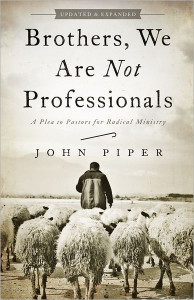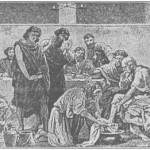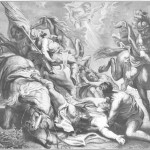As a young seminary student, one of the first questions my friends ask me is “So, what classes are you taking?” Those who know me well know that I am currently about to go into my third semester of Koine Greek studies. When asked about these classes, I’m often met with one of two responses:
- That is so cool! You must be learning all kinds of new things that you just can’t learn without the Greek text!
- What is that for? Don’t we have the English translations?
I never know how to answer either of these types of responses. In fact, when I first began taking these classes I was a little bit at a loss, as I was unable to explain why they are important. Are the studies of original languages (OL) really that fundamental? Can the church function without it? What about the average lay-person, do they need to know them? Should all pastors be able to reference the OL’s, or is it just meant for the research scholars? In an attempt to be able to provide some answers to my friends and the Church, I am going to spend the next three posts discussing the importance of language studies. The remainder of this post will be spent on the general importance and summons to original language studies. The following posts will deal with defending the accuracy of the text and the truth of the text from error, as well as wrestling with an understanding of the nuances and meaning behind the OL’s.
Before I begin, let me remind the reader that at the time of this post I am only entering my third semester of Greek studies. I have yet to even study the Hebrew alphabet, nor enter the pulpit. By no means am I elevating myself as an expert, nor am I elevating a “two-class” Christianity where those who know the languages are better than those without. I am but a novice, at best. I will however advocate a position stressing the importance of OL studies to pastors and the Church.
Brothers, Bitzer was a Banker
I’ve been reading through John Piper’s book entitled Brothers, We Are Not Professionals. What an amazing blessing this book has been to me at this time in my training. In this text, Piper has a chapter entitled “Brothers, Bitzer was a Banker”. The chapter begins by telling of a book released in 1969 entitled Light on the Path. This text is a daily dose of Scripture readings in both the Hebrew and Greek, and is meant to help pastors preserve and improve their ability to interpret the Bible from the OL’s.
The editor’s name was Heinrich Bitzer. He was a banker.
Piper continues this chapter by asking the question “Must we be admonished by the sheep as to what our responsibility is as shepherds?” He cites several important reasons why pastors should be able to wrestle with the OL’s. I will cite several of these reasons below, either paraphrased or directly quoted from this chapter:
- “First, the confidence of pastors to determine the precise meaning of Biblical texts diminishes. And with the confidence to interpret rigorously goes the confidence to preach powerfully.”
- Having to depend on the various (differing) English translations tends to discourage careful textual analysis in sermon preparation. As soon as you really start paying attention to tenses, conjunctions and vocabulary the versions are too diverse to provide a sure analysis. So the preacher often contents himself with the general focus or flavor of the text, and his exposition lacks the precision and clarity which excite a congregation with the Word of God. Boring generalities curse many pulpits.
- For example, most of the modern English translations (RSV, NIV, NASB, NLT) do not enable the expositor to see that “have fruit” in Romans 6:22 links with “bear fruit” five verses later in Romans 7:4. They all translate Romans 6:22 without the word fruit.
- “So what we find in groups where Greek and Hebrew are not cherished and pursued and promoted is that expository preaching—which devotes a good bit of the sermon to explaining the meaning of the text—is not much esteemed by the preachers or taught in the seminaries.”
- “Weakness in Greek and Hebrew also gives rise to exegetical imprecision and carelessness. And exegetical imprecision is the mother of liberal theology.”
- “Where pastors can no longer articulate and defend doctrine by a reasonable and careful appeal to the original meaning of Biblical texts, they will tend to become close-minded traditionalists who clutch their inherited ideas, or open-ended pluralists who don’t put much stock in doctrinal formulations. In both cases the succeeding generations will be theologically impoverished and susceptible to error.”
I can think of no better way to end this section than with Piper’s closing words to his chapter:
Let’s give heed to the word of Martin Luther: “As dear as the gospel is to us all, let us as hard contend with its language.” Bitzer did. And Bitzer was a banker!
The Lowest Common Denominator
If we took a survey of the Church today (specifically the American Church), I would contend that we would find more churches without pastors trained in the languages than those with. For that matter, how many seminaries are still requiring the OL’s? Of those that do, how many require anything more than one semester?
I’ve spoken to many leaders who are ten or more years out of Seminary, and they’ve all but forgotten their OL training. Many I’ve spoken to will say something along the lines of “I have a concordance and Bible software now; it does all the work for me.” Friends, I fear this is similar to walking onto a football field with all of the equipment yet not knowing the rules of the game. Having the tools at our disposal is an important start, but we must know how to play the game!
Many critics will argue that languages are best left to the experts. After all, quite a bit of work is necessary to go from a student who knows the vocabulary, to a scholar who works for translation boards. And this is true. But is there not room in the middle for our pastors to have a working knowledge of the texts from which they preach each week? As Piper also questions in his book, “We have, by and large, lost the Biblical vision of a pastor as one who is mighty in the Scriptures, apt to teach, competent to confute opponents, and able to penetrate to the unity of the whole counsel of God. Is it healthy or biblical for the church to cultivate an eldership of pastors (weak in the Word) and an eldership of professors (strong in the Word)?” When we “leave the work to the experts”, we have essentially separated and professionalized the work of the shepherd into a completely separate role.
One of my favorite artists and poets Propaganda raps in one of his songs: “…See the presence of good art will unconsciously refine a community, and poor art will do an incalculable harm…” I believe this same concept can be applied to our teaching philosophies inside (and outside) the Church. The presence of educated, expository preaching and teaching will unconsciously refine and build up our church communities. Without it, we are stuck teaching to the lowest common denominator, and this will do an incalculable harm. We are already seeing the effects of this, as preachers uneducated in the Word of God are taking the pulpit and preaching all kinds of wishy-washy doctrines, swaying to and fro with lofty opinions and flat out damning interpretations of the text.
If we want to see our Church maintain solid preaching and teaching, we must not neglect the study of the OL’s.
Give them the Bread, not the Bread Factory
It is the responsibility of every preacher in the pulpits to teach the whole counsel of God. James tells us that not many of us should strive to become teachers, as we will be judged more severely (James 3:1). How then can we preach the whole counsel of God and teach to the level at which we are demanded if we cannot understand the languages in which the Word was written? When we are unable to read through the original languages ourselves, we become enslaved to the commentaries. Unable to work through these things on our own, we can but only trust what other people have said on these matters. The Prince of Preachers CH Spurgeon has this to say:
“A man to comment well should be able to read the Bible in the original. Every minister should aim at a tolerable proficiency both in the Hebrew and the Greek. These two languages will give him a library at a small expense, an inexhaustible thesaurus, a mine of spiritual wealth. Really, the effort of acquiring a language is not so prodigious that brethren of moderate abilities should so frequently shrink from the attempt. A minister ought to attain enough of these tongues to be at least able to make out a passage by the aid of a lexicon, so as to be sure that he is not misinterpreting the Spirit of God in his discoursings, but is, as nearly as he can judge, giving forth what the Lord intended to reveal by the language employed. “
Truly, it is the job of the preacher to deliver the bread, not the bread factory. We need not all be scholars, but should we not have the capability to understand the particulars of the language and why certain tenses or constructions are used – and thus its importance on the message?
—–
I know most of you were probably hoping to see some language examples. I am saving those for the other two posts. However, I hope we can all begin to see the importance of the continual study of the OL’s to pastors and the church. For those of us in the Western Church, we have so many resources readily available to assist us in this. To neglect the resources and funding we have at our disposal that much of the global church does not have is simply irresponsible. This is not something that can continue to go neglected in our seminaries and churches today.
What does this mean for us now? Pastors, if you find your OL skills lacking let this be an encouragement for you to refresh your skills. Consider signing up to audit the language courses at your local school, picking up Light on the Path or breaking out your old primers and start working through them. Students, do not neglect your studies thinking the software and commentaries will do all of the work for you. Continue to strengthen your skills and exegesis while you can.
Lay-persons, you may be asking what this all has to do with you. Let me also encourage you that you need not sit this one out. There are plenty of resources out there for you to be able to work through. Consider picking up a key word study bible or an interlinear text (one where the English and OL are next to each other), a concordance, or a copy of something like Logos Bible Study software. Ask your pastors to lead a Bible study workshop at your church. Being able to pick up on small nuances, such as knowing that what many translations render as “servant of Christ” could actually be rendered “slave” (coming from the word δοῦλός) can provide immediate depth and richness to your studies.
Let us encourage and exhort one another to a deeper study of God’s Word all for the glory of the King on the throne!





Wow. Thanks brother.